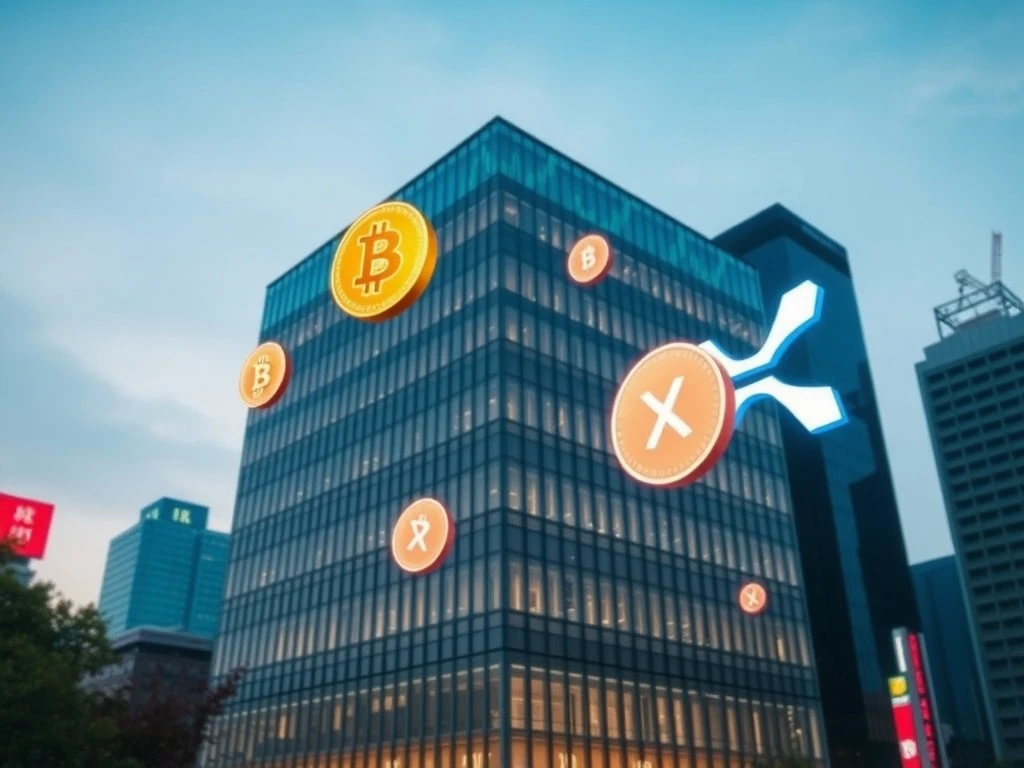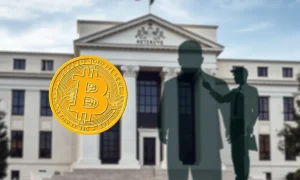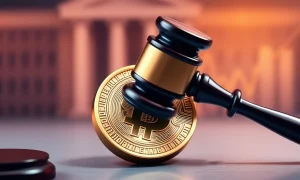SBI Holdings, a prominent Japanese financial services giant, has unveiled groundbreaking plans. They aim to launch Japan’s first dual-asset **Bitcoin XRP ETF**. This significant development could profoundly reshape the nation’s investment landscape. For investors seeking diverse exposure to digital assets, this news signals a major shift in traditional finance. It underscores Japan’s progressive stance on cryptocurrency integration.
Pioneering the Bitcoin XRP ETF Landscape in Japan
SBI Holdings recently announced its ambitious strategy. The company plans to introduce several innovative exchange-traded products. These include a unique gold-crypto ETF and a dual-asset **Bitcoin XRP ETF**. This strategic move positions SBI at the forefront of crypto adoption within Japan’s financial sector.
The company’s recent earnings report detailed these forward-thinking proposals. Initially, a gold-crypto asset ETF bundle is proposed. This investment trust would allocate 51% of its holdings to gold-based ETFs. Meanwhile, the remaining 49% would go into crypto-asset ETFs, specifically those tracking Bitcoin. SBI intends to offer this product publicly as an investment trust in Japan.
The second, and perhaps more anticipated, product is the **Bitcoin XRP ETF**. This innovative fund combines two of the leading cryptocurrencies. Bitcoin (BTC) and XRP (XRP) would form its core. Furthermore, SBI intends to list this product on the Tokyo Stock Exchange. This is Japan’s largest and most influential stock exchange, indicating a serious commitment to mainstream integration.
SBI Group outlines plans to launch crypto ETFs.

Source: SBI Group
Navigating Japan’s Regulatory Framework for Bitcoin XRP ETF
SBI has clearly stated that product launches depend entirely on regulatory approval. This suggests ongoing discussions with Japanese authorities. If approved, these funds would mark a historic milestone. They would be Japan’s first publicly offered crypto ETFs within its tightly regulated financial market.
The company’s earnings report also highlighted efforts by the Financial Services Agency (FSA). The FSA actively works to reclassify crypto assets in Japan. This suggests SBI’s products are under development in preparation for anticipated shifts in regulatory frameworks. This proactive approach aims to align with evolving legal definitions.
News reports have claimed that an XRP-Bitcoin ETF has already been filed. However, it remains unclear if formal proposals are currently with the FSA. They might still be in a pre-filing or planning phase. StockPil reached out to both the SBI Group and the FSA for more information. Neither entity provided a response by publication time, leaving some details pending.
The FSA’s Role in Reclassifying Crypto Assets and Bitcoin XRP ETF Impact
On June 24, the FSA proposed a significant regulatory change. They suggested recognizing specific crypto assets as financial products. This reclassification would place them under the Financial Instruments and Exchange Act (FIEA). The FIEA currently governs traditional financial products in Japan.
This potential reclassification could open doors for broader crypto ETF adoption. Importantly, it might also lead to lower crypto taxes in Japan. Currently, Japan recognizes crypto primarily as a means of payment. This falls under the country’s Payment Services Act. The proposed change signifies a move towards treating certain tokens as securities.
If the FSA’s proposal passes, certain digital tokens will be treated as securities. This shift would provide a much clearer regulatory path for institutions. It could significantly boost institutional adoption and investment. Ultimately, this benefits the broader Japanese crypto market and fosters greater stability.
Broader Implications and Future Outlook for Bitcoin XRP ETF Adoption
The potential launch of a **Bitcoin XRP ETF** holds significant implications. It could set a powerful precedent for other financial institutions globally. Furthermore, it validates cryptocurrency as a legitimate investment class. This is particularly true within a major global economy like Japan.
For investors, these ETFs offer regulated and accessible exposure. They provide diversification without the complexities of direct crypto custody. This simplifies the investment process considerably. It also reduces associated security risks for many retail and institutional investors.
The inclusion of XRP is particularly noteworthy. XRP has faced considerable regulatory scrutiny in some other jurisdictions, notably the United States. Japan’s progressive stance, therefore, could bolster XRP’s global standing. This inclusion further highlights the country’s unique and often forward-thinking approach to digital assets.
Ultimately, Japan aims to foster innovation while protecting investors. The nation consistently balances these two crucial objectives. This progressive regulatory environment could attract more crypto businesses and capital. It positions Japan as a key player in the evolving global digital asset landscape.
The Global Context and Market Potential of Bitcoin XRP ETF
While Japan progresses, other major economies have also explored crypto ETFs. For instance, the United States recently approved spot Bitcoin ETFs. This marked a significant milestone for the asset class. Canada and European nations have also seen the launch of various crypto exchange-traded products. Japan’s move with a dual **Bitcoin XRP ETF** demonstrates its unique innovation.
The market potential for such products in Japan is substantial. Japanese investors are known for their interest in diversified portfolios. Providing regulated avenues for crypto exposure could unlock significant capital. This could flow from both retail and institutional segments. Furthermore, the Tokyo Stock Exchange listing lends considerable credibility and accessibility.
SBI Holdings itself has a history of embracing blockchain and digital assets. Its prior ventures include investments in Ripple and the development of its own crypto exchange. This background lends significant expertise and authority to its current ETF proposals. It underscores a deep understanding of the digital asset ecosystem.
However, challenges remain. Regulatory approval is not guaranteed, and the timeline can be uncertain. Clear guidelines on asset custody, valuation, and market manipulation prevention are crucial. Nevertheless, SBI’s commitment signals a strong belief in the future of digital assets within mainstream finance.
Investor Considerations and Market Impact of the Bitcoin XRP ETF
Investors considering the **Bitcoin XRP ETF** should understand its benefits. These include ease of access and professional management. The ETF structure handles the complexities of buying, storing, and securing cryptocurrencies. This eliminates the need for individual crypto wallets or exchange accounts. It appeals to those less familiar with direct crypto ownership.
Moreover, the dual-asset nature offers built-in diversification. Exposure to both Bitcoin, the largest cryptocurrency by market cap, and XRP, known for its enterprise focus, provides a balanced approach. This could potentially reduce volatility compared to investing in a single asset. It also aligns with traditional portfolio diversification strategies.
The potential for lower crypto taxes, if the FSA’s reclassification occurs, would be another significant draw. Current crypto tax rates in Japan are high. A reclassification could bring them in line with traditional financial products. This would make crypto investments more appealing for a broader investor base. It would encourage long-term holding and reduce speculative trading.
Ultimately, this initiative could cement Japan’s position as a global leader in crypto regulation and adoption. It paves the way for further integration of digital assets into the conventional financial system. This development is keenly watched by global financial institutions and crypto enthusiasts alike.
SBI Holdings’ plans for Japan’s first **Bitcoin XRP ETF** represent a landmark initiative. While regulatory approval is pending, the clear intent signals a maturing crypto market. This development could reshape investment strategies across Japan and beyond. It highlights a future where digital assets integrate seamlessly into mainstream finance, offering new avenues for growth and diversification.
Frequently Asked Questions (FAQs)
1. What is a Bitcoin XRP dual ETF?
A Bitcoin XRP dual ETF is an exchange-traded fund that provides investors with exposure to both Bitcoin (BTC) and XRP (XRP) within a single investment product. It allows for diversification across two major cryptocurrencies.
2. Which company plans to launch this ETF in Japan?
Japanese financial giant SBI Holdings has unveiled plans to launch this innovative dual-asset Bitcoin XRP ETF in Japan.
3. What regulatory hurdle must SBI overcome for the Bitcoin XRP ETF?
SBI Holdings must secure regulatory approval from the Financial Services Agency (FSA) in Japan. This approval is crucial for launching and listing the Bitcoin XRP ETF on the Tokyo Stock Exchange.
4. How could the FSA’s reclassification impact crypto in Japan?
The FSA’s proposal to reclassify specific crypto assets as financial products under the Financial Instruments and Exchange Act (FIEA) could pave the way for more crypto ETFs and potentially lead to lower crypto taxes in Japan, boosting institutional adoption.
5. What are the two types of crypto-related ETFs SBI proposed?
SBI proposed two main crypto-related ETF products: a gold-crypto asset ETF (allocating 51% to gold and 49% to crypto assets like Bitcoin ETFs) and the Bitcoin XRP dual ETF.
6. Where does SBI plan to list the Bitcoin XRP ETF?
SBI plans to list the Bitcoin XRP ETF on the Tokyo Stock Exchange, which is the largest stock exchange in Japan.
























